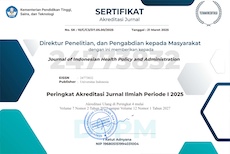Abstract
The emergence of COVID-19 pandemic has made it difficult for people to access health services. According to JKN statistics, FKTP visits was decreased from 337.69 million (2019) to 193.03 (2021). Teleconsultation, a type of telemedicine, could be the right solution so that people can still access the health services they need and protect themselves from the spread of COVID-19. There was an increase in the use of several teleconsultation applications in Indonesia during pandemic, from 4 million to more than 15 million people. However, this rate is only 7.63% of the internet users and 5.6% of the total population of Indonesia, so increasing access to health services through telemedicine is still challenging to achieve. Therefore, this study aims to determine the description and factors related to the intention to use health teleconsultation services during COVID-19 pandemic among Jabodetabek residents aged 19-49. This quantitative study used a cross-sectional design and PLS-SEM data analysis method. The results showed a significant relationship between social influence, perceived usefulness, trust in providers, and trust in the internet on the intention to use teleconsultation services. Intention-to-use was also significantly related to the use of teleconsultation services. In addition, a significant relationship was found between perceived need with trust in the provider, and perceived health risk and perceived ease of use with perceived usefulness.
Bahasa Abstract
Pandemi COVID-19 menyebabkan masyarakat kesulitan dalam mengakses pelayanan kesehatan. Berdasarkan statistik JKN, kunjungan FKTP menurun dari 337,69 juta (2019) menjadi hanya 193,03 juta (2021). Telekonsultasi, salah satu jenis telemedicine, dikatakan dapat menjadi solusi yang tepat agar masyarakat tetap dapat mengakses pelayanan kesehatan yang dibutuhkan sekaligus menjaga diri dari penularan COVID-19. Terdapat peningkatan penggunaan aplikasi telekonsultasi di Indonesia semasa pandemi, dari 4 juta menjadi lebih dari 15 juta orang. Tetapi, angka ini hanya 7,63% dari penduduk pengguna internet dan 5,6% dari total populasi Indonesia sehingga peningkatan akses pelayanan kesehatan melalui telemedicine masih terbilang sulit untuk dicapai. Oleh karena itu, penelitian ini bertujuan untuk mengetahui gambaran serta faktor yang berhubungan dengan intention-to-use layanan telekonsultasi di masa pandemi COVID-19 pada penduduk Jabodetabek usia 19- 49 tahun. Penelitian kuantitatif ini menggunakan desain cross-sectional dengan metode analisis data PLS-SEM. Hasil penelitian menunjukkan adanya hubungan signifikan antara pengaruh sosial, perceived usefulness, trust in provider, dan trust in internet terhadap intention-to-use layanan telekonsultasi. Intention-to-use juga terbukti berhubungan signifikan dengan penggunaan sesungguhnya dari layanan telekonsultasi. Selain itu, ditemukan pula hubungan signifikan antara perceived need dengan trust in provider, serta perceived health risk dan perceived ease of use terhadap perceived usefulness.
Recommended Citation
Salsabila, Isna Mutiara and Sari, Kurnia
(2022)
"ANALYSIS OF FACTORS RELATED TO INTENTION-TO-USE TELEMEDICINE SERVICES (TELECONSULTATION) IN JABODETABEK RESIDENTS DURING THE COVID-19 PANDEMIC IN 2021,"
Journal of Indonesian Health Policy and Administration: Vol. 7:
No.
3, Article 2.
DOI: 10.7454/ihpa.v7i3.6090
Available at:
https://scholarhub.ui.ac.id/ihpa/vol7/iss3/2
Included in
Health Policy Commons, Health Services Administration Commons, Health Services Research Commons











